Oof. The one on the bottom looks like it has disease. Can’t remember the name but the deterioration of the tail is not a good sign.
Navigation
Install the app
How to install the app on iOS
Follow along with the video below to see how to install our site as a web app on your home screen.
Note: This feature may not be available in some browsers.
More options
You are using an out of date browser. It may not display this or other websites correctly.
You should upgrade or use an alternative browser.
You should upgrade or use an alternative browser.
Semi-urgent!!!
- Thread starter blawndie
- Start date
- Tagged users None
Ooof. Hopefully it’s not a disease to where I’m going to have to do a bunch of stuff now with the tank Still strange to me. Why would they die within hours of each other or seconds I don’t know, but literally overnight.Oof. The one on the bottom looks like it has disease. Can’t remember the name but the deterioration of the tail is not a good sign.
Could both have had disease. I read the thread, but don’t recall… were they quarantined?Ooof. Hopefully it’s not a disease to where I’m going to have to do a bunch of stuff now with the tank Still strange to me. Why would they die within hours of each other or seconds I don’t know, but literally overnight.
- Joined
- Dec 8, 2017
- Messages
- 2,200
- Reaction score
- 4,115
I'm sorry you're having trouble!
I am not an expert here, but if I could offer some suggestions:
You don't want to artificially remove your ammonia. You want your rock and sand to function as your bio filter.
It's really important that you fully cycle your saltwater aquarium. If you've been dosing it with Prime all along, you may not have a fully cycled aquarium, in my opinion.
I'm sorry R2R, are we all glossing over this???
What's going on with your "other" tank? I'm not at all trying to sound condescending, I would very much like to help you, but you seem like you're new to reef keeping, and my concern is that you're repeating mistakes over multiple tanks. Such as using Prime.
I am not an expert here, but if I could offer some suggestions:
Prime is super popular with freshwater aquarists, but most here at R2R do not recommend it for marine tanks.Wow I’ve never heard that about Prime.
You don't want to artificially remove your ammonia. You want your rock and sand to function as your bio filter.
It's really important that you fully cycle your saltwater aquarium. If you've been dosing it with Prime all along, you may not have a fully cycled aquarium, in my opinion.
I put in my Duncan and pipe organ because they looked unhappy in my other tank. The coral actually started improving surprisingly to me.
I'm sorry R2R, are we all glossing over this???
What's going on with your "other" tank? I'm not at all trying to sound condescending, I would very much like to help you, but you seem like you're new to reef keeping, and my concern is that you're repeating mistakes over multiple tanks. Such as using Prime.
Honestly, I don’t know their history prior to me buying them, but because my tank was empty at the time (no snail, no Duncan, no pipe organ) I threw them in there.. so it’s probably been a little over 30 days.Could both have had disease. I read the thread, but don’t recall… were they quarantined?
- Joined
- Jul 16, 2009
- Messages
- 5,071
- Reaction score
- 8,108
While you are waiting, I would check the tank temp with another device as well. Just to rule that out.
Just for the record... prime does nothing to ammonia.You don't want to artificially remove your ammonia. You want your rock and sand to function as your bio filter.
It's really important that you fully cycle your saltwater aquarium. If you've been dosing it with Prime all along, you may not have a fully cycled aquarium, in my opinion.
This makes no sense. How would a dechlorinator affect cycling?If you've been dosing it with Prime all along, you may not have a fully cycled aquarium
- Joined
- Dec 8, 2017
- Messages
- 2,200
- Reaction score
- 4,115
I use it for a dechlorinator on my freshwater tanks, that's it. I've never used it for saltwater.While you are waiting, I would check the tank temp with another device as well. Just to rule that out.
Just for the record... prime does nothing to ammonia.
There is nothing wrong with using Prime in a pinch if you MUST use tap water. It does nothing to ammonia/nitrate/nitrite so will not interfere with cycling.I use it for a dechlorinator on my freshwater tanks, that's it. I've never used it for saltwater.
I appreciate you so much. Yes, I am fairly new…. Since. Feb of this year. Let me see if I can get you a quick pic of the other tank. My other problem with doing this may be the lighting because I have two Noo-Psyche k7 pros and the app is awful. The lighting schedule is going every day on automation but when I try to get into the app, I can’t see the percentages of anything.I'm sorry you're having trouble!
I am not an expert here, but if I could offer some suggestions:
Prime is super popular with freshwater aquarists, but most here at R2R do not recommend it for marine tanks.
You don't want to artificially remove your ammonia. You want your rock and sand to function as your bio filter.
It's really important that you fully cycle your saltwater aquarium. If you've been dosing it with Prime all along, you may not have a fully cycled aquarium, in my opinion.
I'm sorry R2R, are we all glossing over this???
What's going on with your "other" tank? I'm not at all trying to sound condescending, I would very much like to help you, but you seem like you're new to reef keeping, and my concern is that you're repeating mistakes over multiple tanks. Such as using Prime.
Backstory on my original tank….HUGE cyano outbreak after my husband tried to take care of it for me while I had Covid and then pneumonia for a month and a half. Everything now is testing good in my opinion…
Ammonia 0
Nitrite 0
Nitrate 10
Haven’t tested phosphates in a while, but it’s always the lowest color on the API test. I know API sucks but that’s what I have right now. Periodically I go down to the our big city and pay for a test but they say everything is pretty good except for usually my calcium is it tidbit low but they say nothing to worry about. OK, I’m going to rush and try to get a picture to see if that helps. Let me see if I can get the lighting to cooperate.
- Joined
- Dec 8, 2017
- Messages
- 2,200
- Reaction score
- 4,115
It definitely wouldn't, and I'm sorry if I am giving bad advice here. I don't use Prime in my saltwater aquaria, but I use it as a dechlor in my freshwater systems for convinece.This makes no sense. How would a dechlorinator affect cycling?
I did think that it had some kind of ammonia "binding" capability in saltwater aquaria, which I have always thought would impede a nitrogen cycle.
If Prime dos not bind ammonia in saltwater aquaria, then I apologize, and I thank you helping me out here too ;-)
Again, I think of Prime as a dechlor for freshwater and would absolutely use it to treat tap water to make saltwater in the event of emergencies, as you said. Thank you for informing me about its limited uses as an ammonia binding agent.There is nothing wrong with using Prime in a pinch if you MUST use tap water. It does nothing to ammonia/nitrate/nitrite so will not interfere with cycling.
For your reading pleasure...I definitely wouldn't, and I'm sorry if I am giving bad advice here. I don't use Prime in my saltwater aquaria, but I use it as a dechlor in my freshwater systems for convince.
I did think that it had some kind of ammonia "binding" capability in saltwater aquaria, which I have always thought would impede a nitrogen cycle.
If Prime dos not bind ammonia in saltwater aquaria, then I apologize, and I thank you you helping me out here too ;-)
Again, I think of Prime as a dechlor for freshwater and would absolutely use it to treat tap water to make saltwater in the event of emergencies, as you said. Thank you for setting informing me about its limited uses as an ammonia binding agent.
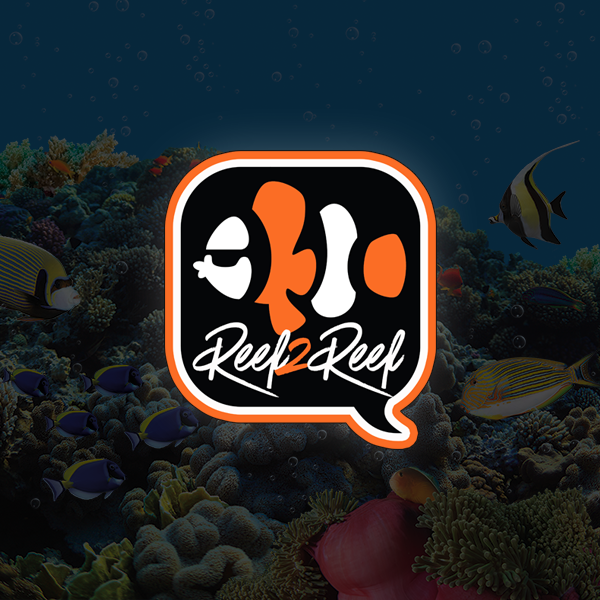
A Deep Dive on Ammonia Neutralizer Chemistry - Prime, ClorAm-X, Rongalite and friends.
I suppose Clor AM X is good for saltwater aquariums as It’s sold as a freshwater pond product.?? Pls confirm. All of this seems to suggest we’d be better off adding Fritz turbo900 at an aggressive rate to decrease ammonia? Basically none of them work as advertised. This thread may be of...
 www.reef2reef.com
www.reef2reef.com
On it!I use it for a dechlorinator on my freshwater tanks, that's it. I've never used it for saltwater.
- Joined
- Dec 8, 2017
- Messages
- 2,200
- Reaction score
- 4,115
Thank you for the followup. I would love to give these a readFor your reading pleasure...

A Deep Dive on Ammonia Neutralizer Chemistry - Prime, ClorAm-X, Rongalite and friends.
I suppose Clor AM X is good for saltwater aquariums as It’s sold as a freshwater pond product.?? Pls confirm. All of this seems to suggest we’d be better off adding Fritz turbo900 at an aggressive rate to decrease ammonia? Basically none of them work as advertised. This thread may be of...www.reef2reef.com
Unfortunately, as I suspected can’t figure out how to turn on the lights manually right now… so this video and pic is probably unhelpful ? Please remember THIS IS NOT THE OP TANK. PLEASE IF YOU’RE SKIMMING…. Don’t be confused. This is my original as someone asked to see.
Also doing a quick recheck on the temp…
*** edited to add that yes, I do see I blew the sand away in the bottom right corner trying to find good flow for my anemone that’s in the basket, when I was moving one of the powerheads and have not moved it back.
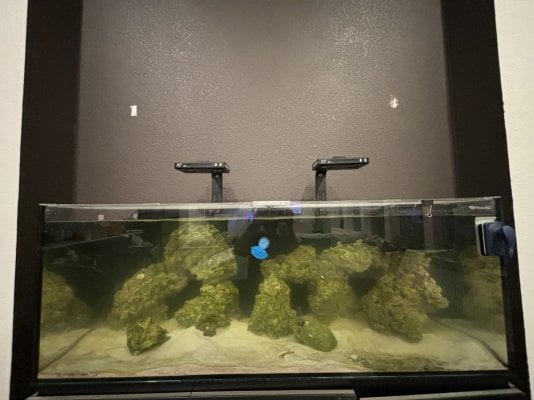
Also doing a quick recheck on the temp…
*** edited to add that yes, I do see I blew the sand away in the bottom right corner trying to find good flow for my anemone that’s in the basket, when I was moving one of the powerheads and have not moved it back.

Attachments
Last edited:
OK, the mercury thermometer I forgot is in the tank in babies nursery and I’m not about to go in there I pulled this one off of my freshwater tank though so seems to be pretty close… 2 degrees difference max comparing all. Also, this one is only external on the class so in my mind it makes sense that it’s a little bit lower than the internal one I have. My thermostat in the house is 77.While you are waiting, I would check the tank temp with another device as well. Just to rule that out.
Just for the record... prime does nothing to ammonia.
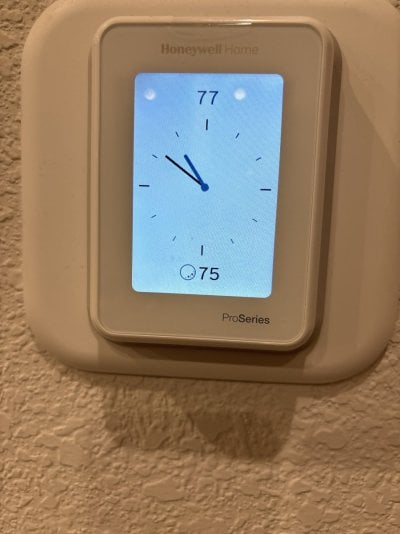
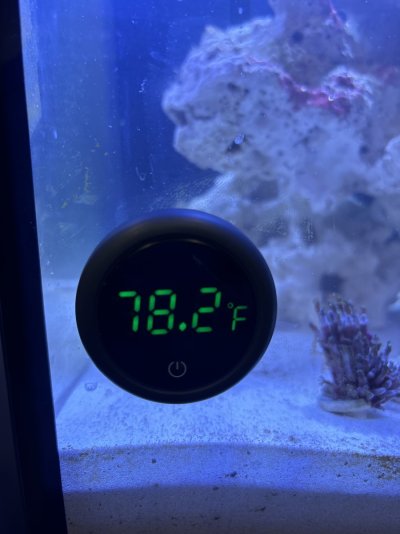
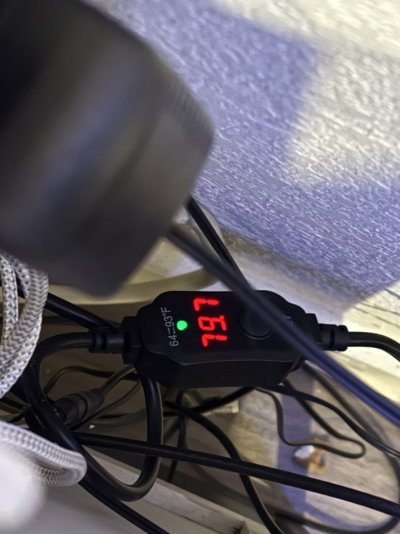
- Joined
- Dec 8, 2017
- Messages
- 2,200
- Reaction score
- 4,115
Believe it or not, I have an admittedly rusty BS in Bio with a minor in Chem (I work in another industry), but I thought this was a really good post that you linked. My Organic Chem is a little rusty to follow the equation, but I think the take home is this:For your reading pleasure...

A Deep Dive on Ammonia Neutralizer Chemistry - Prime, ClorAm-X, Rongalite and friends.
I suppose Clor AM X is good for saltwater aquariums as It’s sold as a freshwater pond product.?? Pls confirm. All of this seems to suggest we’d be better off adding Fritz turbo900 at an aggressive rate to decrease ammonia? Basically none of them work as advertised. This thread may be of...www.reef2reef.com
You need a LOT of the chemical, and you need a LOT of patience because it takes hours and hours to approach the final binding amount.
I have never advised anyone to use Prime in a reef tank during the cycle, because I had just assumed that it would "bind up" ammonia, and I thought it would do so "instantly", as advertised. And I think you would see my thought process as to why that would be bad.
Now I understand that this is not what the product does. Thank you again for clearing this up for me
All right, I’m in the US here, Texas to be exact and it’s getting late with six kiddos nine and under… I may or may not fall asleep pretty soon lol. But I promise I super appreciate everyone trying to help and I’m going to check back. This is really important to me. Not only because the ocean and its life has always been calming to me, I think it’s helping me a bit with my PTSD from losing a kiddo. Don’t want to sound sad and sappy, but I just want to reiterate that I want to learn if you want to throw out something that you see that sticks out to you, I won’t get my feelers hurt and would actually love the critiques..Night y’all.
Similar threads
- Replies
- 3
- Views
- 123
- Replies
- 3
- Views
- 166
- Replies
- 7
- Views
- 190
- Replies
- 2
- Views
- 144
- Replies
- 6
- Views
- 113




















